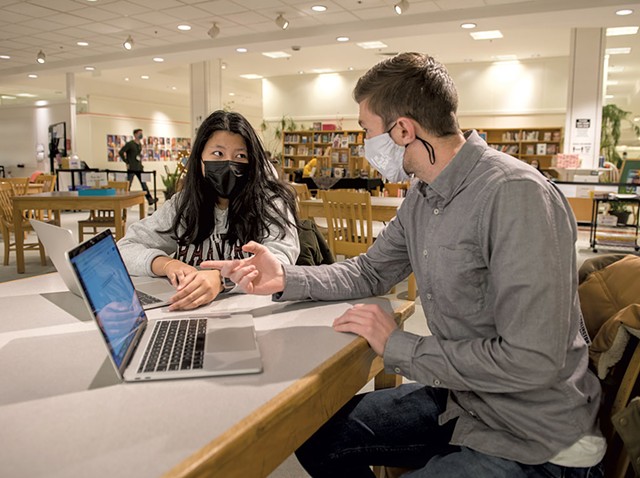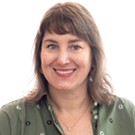Switch to the mobile version of this page.
Vermont's Independent Voice
- News
- Arts+Culture
- Home+Design
- Food
- Cannabis
- Music
- On Screen
- Events
- Jobs
- Obituaries
- Classifieds
- Personals
Browse News
Departments
-
News

Middlebury College President Patton to Step Down…
-
News

Overdose-Prevention Site Bill Advances in the Vermont…
-
Housing Crisis

'We're Leaving': Winooski's Bargain Real Estate Attracted…
- Aggressive Behavior, Increased Drug Use at Burlington's Downtown Library Prompt Calls for Help City 0
- An Act 250 Bill Would Fast-Track Approval of Downtown Housing While Protecting Natural Areas Environment 0
- Through Arts Such as Weaving, Older Vermonters Reflect on Their Lives and Losses This Old State 0
Browse Arts + Culture
View All
local resources
Browse Food + Drink
View All
Browse Cannabis
View All
-
Culture

'Cannasations' Podcaster Kris Brown Aims to 'Humanize'…
-
True 802

A Burlington Cannabis Shop Plans to Host…
-
Business

Judge Tosses Burlington Cannabiz Owner's Lawsuit
-
Health + Fitness

Vermont's Cannabis Nurse Hotline Answers Health Questions…
-
Business

Waterbury Couple Buy Rare Vermont Cannabis License
Browse Music
View All
Browse On Screen
Browse Events
Browse Classifieds
Browse Personals
-

If you're looking for "I Spys," dating or LTRs, this is your scene.
View Profiles
Special Reports
Pubs+More
Programs Help Disadvantaged Vermont Students Achieve Higher-Ed Goals, but Inequity Remains
Published December 22, 2021 at 10:00 a.m. | Updated December 22, 2021 at 10:27 a.m.
click to enlarge 

- Daria Bishop
- Samjana Rai discussing her college essay with Adam Hurwitz of the University of Vermont's Upward Bound program in the Burlington High School library
Samjana Rai knew no English when, at age 12, she moved with her family from Nepal to the United States. But now, as a senior at Burlington High School, Rai has applied to half a dozen colleges and has a few more applications to send in before the January 1 deadline.
Rai's parents don't speak English and didn't attend high school or college, so the teenager needed guidance to achieve her higher-education goals. She credits a free, decades-old federal program called Upward Bound with providing her one-on-one support that led her to the cusp of college. Over two years, staff helped Rai select high school courses and complete college applications, essays and financial-aid forms.
"They actually sit next to you, tell you what to do and answer questions," Rai said. "They're like a tutor, mentor, your friends — everything."
At least three similar federal programs operate in the state, providing invaluable help to low-income students or those who would be the first in their family to attend college. The support is needed: In 2020, just 46 percent of Vermont high school grads from historically marginalized groups — those in poverty, English language learners, those who are BIPOC and those with disabilities — ultimately enrolled in higher ed, compared to 62 percent of all students. Combined with the disconnectedness and uncertainty brought on by the pandemic, the divide has only deepened, educators say.
"We have tons of interest ... because I think we've shown how successful students can be when they commit to this kind of preparation," said Adam Hurwitz, the program director for a chapter of Upward Bound run through the University of Vermont. "And the need is just so high. We could probably serve two programs' worth of students."
Upward Bound is a product of federal education reforms passed during the 1960s. Today, it has 960 chapters across the country, including four in Vermont. The one based at UVM, with a staff of two and a budget of $312,000, supports 63 kids from Burlington and Winooski. One requirement to take part? A strong drive to succeed.
"We're very clear with them from the outset that this is a pretty big commitment," Hurwitz said.
The program has been extremely successful. Eighty-nine percent of students who participated in the program and graduated in 2021 from Burlington and Winooski high schools went directly to college. Some have gone on to elite institutions.
Key Nguyen connected with Upward Bound during his first year at Winooski High School, when he was a new arrival from Vietnam who spoke little English. With the help of his counselors, he earned a full-ride scholarship to UVM in 2017 and is now getting his master's degree in nursing at the University of Pennsylvania.
His classmate, Rainbow Chen, also participated in the program, then went to Brown University. She is now a Fulbright scholar studying education in Europe. The program played a "monumental" role in her ability to attend a selective college, Chen said.
It also "creates a community ... and brings all of us together, building a place where we don't feel left out or scrutinized for having the identities we have," Chen wrote in an email.
In rural Essex County, Canaan Memorial High School senior Melody Oakes has her heart set on higher ed. Oakes, whose parents didn't attend college, has applied to 15 schools with help from an outreach counselor at GEAR UP, a program through the Vermont Student Assistance Corporation. Using federal dollars, VSAC sends mentors to some 75 middle and high schools across the state through GEAR UP and another program called Talent Search, both of which have similar missions to Upward Bound.
Though many students from her high school stay local and go into the workforce after graduation, Oakes said she wants to take a different path. Once she finds out where she's been accepted, she'll work with her counselor to assess the best options, both financially and academically.
"I kind of want to go out and do my own thing," Oakes said. "I want to go to college to be able to provide for myself in the future ... not only just the money but find a job that I can be in that I will enjoy."
The 2019 college admissions scandal — in which well-off parents, including CEOs and celebrities, paid bribes to get their kids into college — made clear that the playing field isn't level. More affluent students can afford SAT prep courses and hire tutors. Their parents, who are often college-educated, generally have an easier time navigating college applications.
Programs such as Upward Bound and GEAR UP aim to make the process more equitable. But their reach is limited — in part, by funding.
"That's very tough," said Matt Yu, assistant director at UVM's Upward Bound program. "Because it's like, Dang, I know there's more need here. And those kids [who don't participate], what happens to them?"
Other organizations are trying to fill in the gaps. The nonprofit King Street Center recently hired an academic and career advocate to help older teens plan for what comes after high school. Dacia Ostlund, the center's associate director, noted that programs such as Upward Bound are "for very high fliers, students that get the best grades, and they're sort of recruited.
"That's not every kid," she continued. "But it doesn't mean that other kids don't deserve the same level of support and opportunity. They just need to find where their path is going to lead them."
Filling the new position for the center is Yuol Herjok. He attended Burlington schools after moving here from Sudan and graduated from what was then Lyndon State College in 2017. Yuol credits his parents, a mentor and staff from the King Street Center with helping him on his path to higher education.
One of the most challenging aspects of the application process, especially for families who speak limited English, Yuol said, is completing the Free Application for Federal Student Aid, known as the FAFSA. Not only do students have to fill out a complicated form, but they also need to provide a long list of documents to show their financial status.
"A lot of my peers just didn't have that strong support system compared to me, and, as a result, a lot of them didn't end up going to college. And it's not because I was smarter than them, or anything like that. It's just that the process was very difficult," Yuol said.
In the face of a pandemic, sometimes even intensive support isn't enough.
This year, Upward Bound and similar programs saw a significant jump in the number of students who had planned to attend college in the fall but didn't due to the financial and social disruptions of the pandemic, Upward Bound director Hurwitz said. One Burlington student, according to Hurwitz, was accepted to a top-tier university — and received $70,000 in annual scholarships and grants — but turned down the offer so he could work to help support his family. The student currently attends the Community College of Vermont part time.
"I've seen instances where the pandemic did light a fire under some folks," said Yu, Upward Bound's assistant director, "but then I've also seen ... a sense of hopelessness, and then [students] feel like giving up, or they feel like nothing really matters."
Ostlund said she's noticed "a level of disconnect and alienation" that has affected the social-emotional wellness and drive of the primarily refugee and immigrant youth who attend the King Street Center. She attributes it to both COVID-19 and the closure of the Burlington High School campus in the fall of 2020 after toxic chemicals were found there. Students have been attending classes at a former Macy's department store.
The mental health challenges have made the jobs of mentors and school guidance counselors all the more important. In addition to offering academic, college and career counseling, counselors must provide social and emotional support to students — work that has played an outsize role during the pandemic, said Meg Hughart Fugate, a guidance counselor in the South Burlington School District.
It can be difficult to keep up when counselors have about 250 students on their caseload. At Burlington High School, where 57 percent of all graduates went directly to college this year — compared to just 39 percent of low-income students — guidance counselor Karen Prouty thinks that she and her colleagues are doing a good job reaching all kids. But she'd support hiring more counselors so they could spend more time with each student. Collaborating with outside organizations such as Upward Bound, plus tapping into volunteers and mentors, can ensure that students get the help they need, she added.
Ostlund, at the King Street Center, also believes in a collaborative approach.
"It's about working together as a community to support children," she said. "It's knowing who you can call on and who will be a partner in this work to help kids succeed."
The original print version of this article was headlined "College Try"
Related Stories
Got something to say?
Send a letter to the editor
and we'll publish your feedback in print!
More By This Author
About The Author

Alison Novak
Bio:
Alison is the former managing editor at Kids VT, Seven Days' parenting publication and writes about education for Seven Days.
Alison is the former managing editor at Kids VT, Seven Days' parenting publication and writes about education for Seven Days.
Speaking of...
Comments
Comments are closed.
From 2014-2020, Seven Days allowed readers to comment on all stories posted on our website. While we've appreciated the suggestions and insights, right now Seven Days is prioritizing our core mission — producing high-quality, responsible local journalism — over moderating online debates between readers.
To criticize, correct or praise our reporting, please send us a letter to the editor or send us a tip. We’ll check it out and report the results.
Online comments may return when we have better tech tools for managing them. Thanks for reading.
- 1. 'We're Leaving': Winooski's Bargain Real Estate Attracted a Diverse Group of Residents for Years. Now They're Being Squeezed Out. Housing Crisis
- 2. Aggressive Behavior, Increased Drug Use at Burlington's Downtown Library Prompt Calls for Help City
- 3. Through Arts Such as Weaving, Older Vermonters Reflect on Their Lives and Losses This Old State
- 4. Overdose-Prevention Site Bill Advances in the Vermont Senate News
- 5. High School Snowboarder's Nonprofit Pitch Wins Her Free Tuition at UVM True 802
- 6. An Act 250 Bill Would Fast-Track Approval of Downtown Housing While Protecting Natural Areas Environment
- 7. From the Deputy Publisher: Winooski, My Town? From the Publisher
- 1. Totally Transfixed: A Rare Eclipse on a Bluebird Day Dazzled Crowds in Northern Vermont 2024 Solar Eclipse
- 2. Zoie Saunders, Gov. Scott’s Pick for Education Secretary, Faces Questions About Her Qualifications Education
- 3. Don't Trash Those Solar Eclipse Glasses! Groups Collect Them to Be Reused 2024 Solar Eclipse
- 4. State Will Build Secure Juvenile Treatment Center in Vergennes News
- 5. Vermont Awarded $62 Million in Federal Solar Incentives News
- 6. New Jersey Earthquake Is Felt in Vermont News
- 7. Barre to Sell Two Parking Lots for $1 to Housing Developer Housing Crisis



































